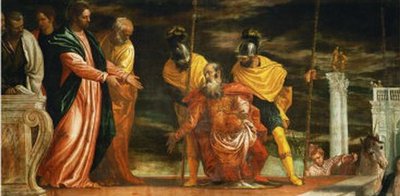Thoughts for the Day
Monday, 13th September 2021: The Centurion's servant
Prayer Jesus Luke 7 Healing
Reading : Verses from Luke, Chapter 7

After Jesus had finished all his sayings in the hearing of the people, he entered Capernaum. A centurion there had a slave whom he valued highly, and who was ill and close to death. When he heard about Jesus, he sent some Jewish elders to him, asking him to come and heal his slave. When they came to Jesus, they appealed to him earnestly, saying, 'He is worthy of having you do this for him, for he loves our people, and it is he who built our synagogue for us.'
And Jesus went with them, but when he was not far from the house, the centurion sent friends to say to him, 'Lord, do not trouble yourself, for I am not worthy to have you come under my roof; therefore I did not presume to come to you. But only speak the word, and let my servant be healed. For I also am a man set under authority with soldiers under me; and I say to one "Go", and he goes, and to another, "Come", and he comes, and to my slave, "Do this", and the slave does it.'
When Jesus heard this he was amazed at him, and turning to the crowd that followed him, he said, 'I tell you, not even in Israel have I found such faith.' When those who had been sent returned to the house, they found the slave in good health.
(Church in Wales Lectionary, New Revised Standard Version)
Thoughts
This miracle of the Healing of the Centurion's Servant, is found in both Matthew and Luke's Gospel. It is another example of a Gentile understanding that no Jew would want to enter their house, and so make themselves ritually unclean. Jesus is astounded by the man's faith and heals the servant.
There are links between this story and the Prayer of Humble Access which is said by Anglicans around the world, and is much loved. The prayer was first included in the 1548 Prayer Book, and kept in the 1549 Prayer Book, before being included in the 1662 Book of Common Prayer.
There are a number of illusions to scripture in this prayer, in particular to the story of Jesus and the Centurion, and to the Healing of the Canaanite Woman's daughter in Matthew 15.21-28. When Jesus says he has come only to the house of Israel, she answers him by saying that "even the dogs eat the crumbs that fall from the master's table". Jesus heals her daughter.
I have put the prayer below, and highlighted the connecting thoughts in the text above and in the prayer:
The Prayer of Humble Access:
We do not presume,
to come to this Your table, merciful Lord,
trusting in our own righteousness,
but in Your manifold and great mercies.
We are not worthy so much as
to gather up the crumbs under Your table.
But You are the same Lord
Whose nature is always to have mercy.
Grant us, therefore, gracious Lord,
so to eat the flesh of Your dear Son Jesus Christ
and to drink His blood,
that we may evermore dwell in Him
and He in us. Amen.
Prayer
Lord Jesus,
help us to realise how unworthy we are
to receive the gifts You offer
at the Communion table,
and not to presume we have a right to receive Your gift of mercy,
but to recognise that when we take the bread and wine
we are once more in communion with You.
Amen.
If you would like to look up the story of the Canaanite woman's daughter, click the site below: